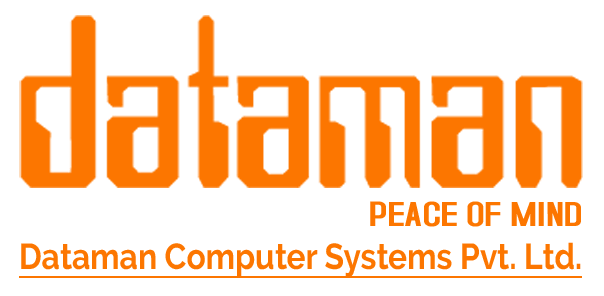- +91 9511117684
- shweta@dataman.in
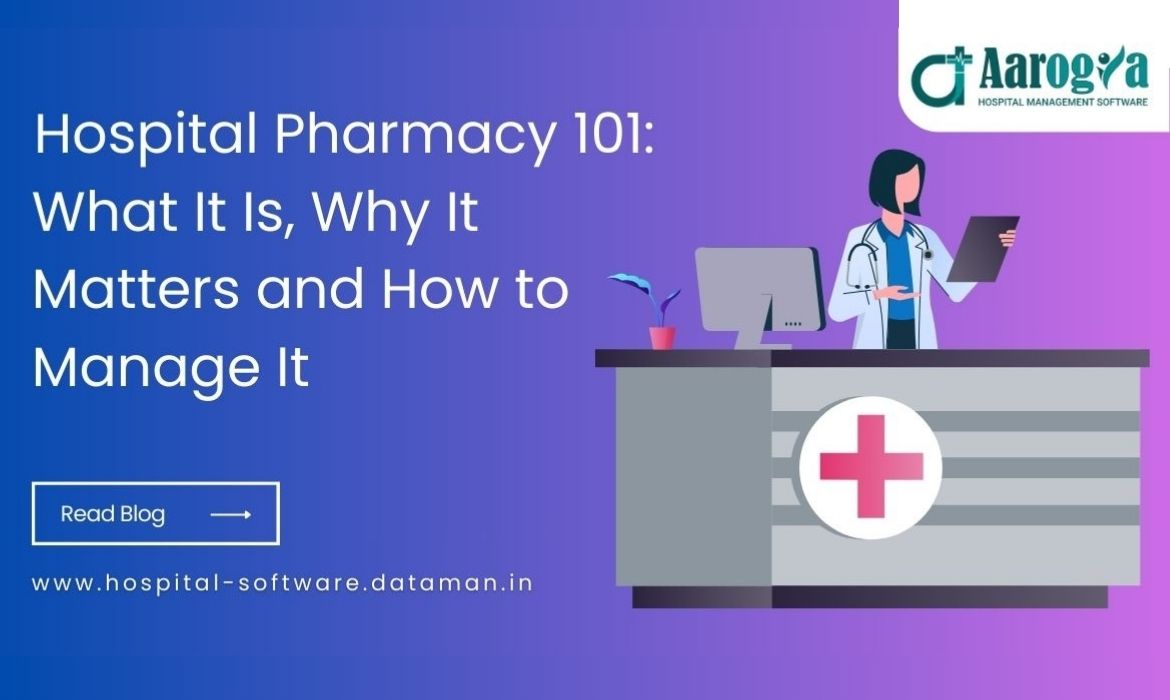
Table of Contents
Post Views: 16,171
If you work in a hospital, you know how important it is to have a well-functioning pharmacy department. The pharmacy department is responsible for providing medicines and medical devices to the patients and staff, as well as ensuring their safe, effective, and efficient use.
But managing a hospital pharmacy is not an easy task. It involves a lot of planning, organizing, implementing, and monitoring of various policies, procedures, and systems. It also requires a lot of coordination and collaboration with other departments and units of the hospital, as well as with external stakeholders and partners. And it demands a high level of knowledge, skills, and professionalism from the pharmacy staff and other members of the health care team.
That’s where the role of the pharmacy management software comes in that can help you run your hospital pharmacy more smoothly and effectively. These systems are designed to meet the specific needs and challenges of hospital pharmacy, and to offer you a range of benefits and features that can make your work easier and more rewarding.
In this blog, we will tell you more about what hospital pharmacy is, why it matters, and how to manage it. We will also show you how our pharmacy management software can help you improve your hospital pharmacy performance and outcomes.
What is Hospital Pharmacy | Hospital Pharmacy Definition
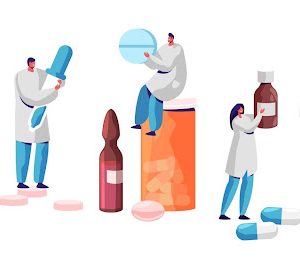
Pharmacy Management System
The department of the hospital that deals with procurement, storage, compounding, dispensing, and distribution of drugs is hospital pharmacy. These pharmacies are located within the hospitals or healthcare facilities. Apart from dispensing medicine for IPD patients, a hospital pharmacy may also dispense medicine over-the-counter and prescription medicines to OPD patients.
Also Read: OPD vs IPD
As per a patient’s medication schedule, hospital pharmacies provide medications to the wards and to ICU. Hospitals dealing with a larger number of patients use Pharmacy Management Software to speed up the process of medicine distribution.
Hospital pharmacists are the experts on medicines and medical devices in the hospital. They work closely with doctors, nurses, and other health professionals to ensure that patients receive the best possible treatment and care.
As per Guidelines on World Health Organization, hospital pharmacy is defined as “the area of pharmacy concerned with the science and practice of rational medication use in hospitals and other health care facilities”.
Also Read : LIMS(Laboratory Information Management System) and Its Function
But first let’s discuss the difference between a Hospital Pharmacy and a General Pharmacy.
How Hospital Pharmacy is different from General Pharmacy?
Typically the functions of a Hospital Pharmacy are wider and need more organisation. They serve as the backbone of healthcare institutions. Let’s see some of the important functions of a hospital pharmacy.
| Hospital Pharmacy | General Pharmacy |
| Serves IPD and OPD patients of a hospital or medical center | Serves the general community, thus have a wider patient range. |
| Provides specialized or investigational medications | Provide common and over-the-counter medications |
| Prepares and dispenses sterile products like injections, fluids etc. | Prepares and dispenses Oral and topical products like tablets, creams etc. |
| Works closely with other departments of the hospital and health professionals | Works directly with customers to provide drug information and advice |
| May require additional education and training to develop advanced skills and specialization | May require customer service and business skills to manage the pharmacy |
Functions of Hospital Pharmacy
- First and foremost comes the selection of inventory. Your hospital pharmacy should be capable of medication therapy management (MTM) for your patients. This means that hospital pharmacists work closely with physicians, nurses, and other health care providers to select, prescribe, monitor, and adjust medications for each patient, based on their individual needs, conditions, and responses. Accordingly the pharmacy should maintain the stocks of medicines and handle the regular procurement.
- Hospital pharmacies have to supply and distribute medications and medical devices throughout the hospital across all departments. This involves managing the inventory, storage, and delivery of medications and devices. Also it is the job of these pharmacies to take care of the quality, safety, and security of these medical paraphernalia.
- Since these pharmacies deal directly with your patients it becomes their duty to provide information and education to patients and health care professionals. They have to ensure that they are communicative enough and understand the local dialect of your patients, so as to give them the best medical advice. Your pharmacy team is your D2C sales force, so the management has to be fast and efficient in handling operations.
These pharmacies are seemingly small but a crucial part of your hospital. Now that you know the functionality, let’s have a look at the challenges faced by them.
Challenges in Hospital Pharmacy Management
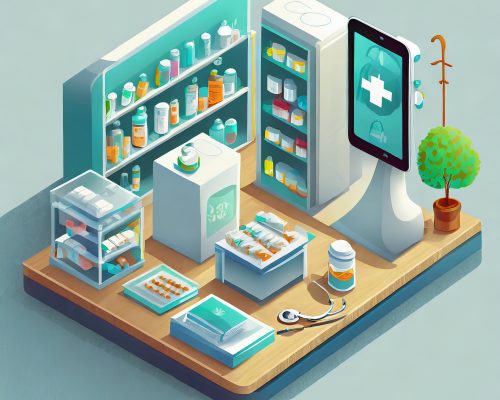
Challenges in Pharmacy Management
These are some common challenges that most hospital pharmacy management face:
Medication errors: These are mistakes that occur in the prescribing, dispensing, or administration of medications, which can cause harm to patients or reduce the effectiveness of treatment. Medication errors can be caused by factors such as human error, communication breakdown, system failure, or lack of knowledge. We all have heard jokes on Doctor’s handwriting. Funny however they may seem, this actually is one of the reasons behind incorrect medication. The Institute for Safe Medication Practices (ISMP) estimates that medication errors occur in 1 in every 135 medication doses administered in hospitals. This translates to a staggering number of incidents every year, with potentially serious consequences.A study published in the Journal of the American Medical Association found that a 10% increase in drug shortages was associated with a 5% increase in medication errors
Drug shortages: These are situations where the supply of a medication does not meet the demand, either due to insufficient production, distribution, or availability. Drug shortages can affect the quality and continuity of patient care, as well as increase the costs and risks of treatment.
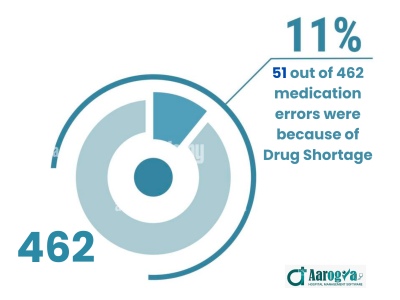
Drug Shortage Data
A French study of data on Adverse Drug Reactions(ADRs)
Complex medication regimens: These are treatment plans that involve multiple medications, doses, routes, or schedules, which can be difficult to manage and monitor. Complex medication regimens can be necessary for patients with multiple or chronic conditions, or who require specialized or individualized therapy. They can pose challenges, such as medication adherence, patient education, drug monitoring, or medication reconciliation. About 30-50% of elderly patients in India take 5 or more medications (polypharmacy), while 10-20% take 10 or more. Studies show that adherence to complex medication regimens can be as low as 40-50% in India, leading to poor health outcomes and increased healthcare costs. More than 6.7 million Indians suffer from adverse drug events (ADEs) annually, often due to complex regimens.
Ok, so the Hospital Pharmacy has its fair share of challenges and problems. These are not general issues that can be taken care of once and forgotten about. These are real life problems occurring in day to day lives caused due to human error, scarcity of resources or regular emergencies. To overcome these challenges, the hospital pharmacies should be prepared with an efficient Pharmacy management software. The usage of such tools however does not guarantee an error free solution always but helps the hospitals adhere to regular compliance and reduce the risk of emergencies.
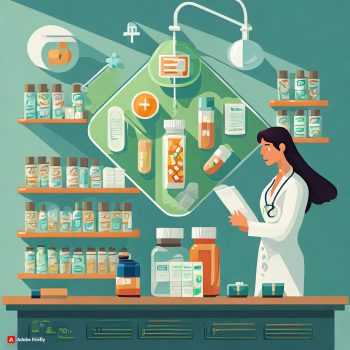
Advantages of pharmacy management
Advantages of a Hospital Pharmacy Software
Medication order entry and verification systems: These are systems that allow pharmacists to enter, review, and verify medication orders electronically, using standardised formats, protocols, and alerts. These systems can help reduce medication errors by eliminating handwritten prescriptions, detecting potential errors, and providing relevant information and guidance.As per a report published in the National Library of Medicine, Hospital pharmacies dispense an average of 3.5 million doses per year, equivalent to roughly 9,500 doses per day. That’s enough to fill an Olympic-sized swimming pool with medication bottles!
Real-time inventory tracking and alerts: Pharmacy softwares allow pharmacists to monitor and manage the inventory of medications and devices, using barcode scanning, RFID tagging, or other technologies. These systems can help prevent drug shortages by providing real-time data on stock levels, expiration dates, and usage patterns, as well as generating alerts and reports on supply and demand.
Clinical decision support tools: The system provides pharmacists with evidence-based recommendations and feedback on medication therapy, using clinical guidelines, algorithms, or databases. These tools can help optimize medication regimens by suggesting the most appropriate, effective, and safe medications, doses, and schedules for each patient, as well as identifying potential problems or opportunities for improvement.
Automated dispensing systems: These are systems that allow pharmacists to dispense medications and devices automatically, using robots, carousels, or cabinets. These systems can help improve efficiency and accuracy by reducing manual tasks, saving time and space, and ensuring the right medication and device for the right patient at the right time.
Enhanced dispensing accuracy: The solution helps hospital pharmacists verify and validate prescriptions, calculate doses, and label and package medicines and medical devices. It can also help them track and record the dispensing history and status of each patient. This can reduce dispensing errors, improve patient safety, and ensure compliance with legal and ethical requirements.
Increased productivity and efficiency: With the help of pharmacy management software, hospital pharmacists can automate and simplify their routine tasks, such as data entry, billing, and reporting. It can also help them integrate and communicate with other systems and departments, such as electronic health records, laboratory, radiology, and billing. This can save time, reduce workload, and improve workflow and coordinations.
Better decision making and quality improvement: Pharmacy management software can help hospital pharmacists collect and analyze data and information on various aspects of their pharmacy practice, such as drug utilization, drug costs, drug outcomes, and patient satisfaction. It can also help them generate and access reports and dashboards that can provide insights and feedback on their performance and progress. This can help them identify and address gaps, issues, and opportunities for improvement, and enhance the quality and value of their pharmacy services.
Also Read: 5 Ways Hospital Billing Software Can Save You Money
Wrapping Up
Hospital pharmacies are essential for providing safe and effective medication therapy for hospitalized patients, as well as for supporting other healthcare services and activities. However, hospital pharmacies also face many challenges and complexities that require innovative and efficient solutions. Pharmacy management software is the perfect solution for hospital pharmacies that want to improve their performance and quality of care.
If you are interested in learning more about our software and how it can transform your hospital pharmacy operations, please contact us today for enquiry or a free demo.
0
